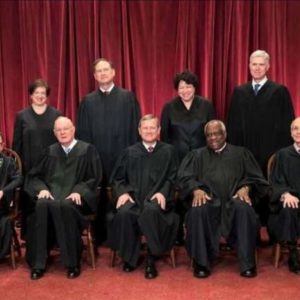The most important rule in any organization answers this question: Who has the power to make the rules? The framers of the Constitution understood this so well that they put the answer in the very first section of the Constitution. Article I, Section 1 declares that all laws will be made by Congress.
This is a key issue in this week’s high-profile cases involving the meaning of the 1964 Civil Rights Act’s prohibition on sex discrimination. Does this law prohibit discrimination on the basis of sexual orientation and gender identity as well as its historical meaning of ensuring equal treatment for women and men?
Many emotionally laden arguments are being raised from both sides about a very different question. These arguments pose the question: Should the law include a prohibition on discrimination on the basis of LGBT status? That is a political question — not a legal one. And the Supreme Court was designed to answer only legal questions.
There are incredibly good reasons that underlie the system created by the framers of the Constitution.
A representative democracy, properly known as a constitutional republic, is premised on the moral principle that the people should elect the officials that make all laws. If the people don’t like the laws that are being made, voters should have the ability to “throw the rascals out” and get new leaders who will make laws more to their liking.
If judges or administrative agencies make new laws that the people must obey, voters are robbed of their constitutional authority to vote the lawmakers out of office.
This really shouldn’t be a partisan issue. It takes little imagination to realize that the political winds change. In some seasons of our history, the political leanings of both courts and agencies have waxed and waned. If judges that you like are authorized to make laws, then judges you don’t like will possess the same power.
Advocates for the LGBT position argue that they are not asking the Supreme Court to make a new law, rather they are simply seeking to enforce the 1964 Civil Rights Act as written.
This argument doesn’t withstand even a cursory analysis.
Another famous Supreme Court case explains the reason. In 2000, the Food and Drug Administration’s efforts to regulate smoking was challenged in the Supreme Court. The FDA claimed that tobacco was a “drug” and cigarettes were a “device” under the congressional act defining the scope of that agency’s authority. But the court pointed out that Congress had considered numerous legislative proposals to grant the FDA power over tobacco products and had rejected them all. Congress’s own action proved that the meaning it had given to “drug” and “device” didn’t include the regulation of smoking products.
The same thing is true with LGBT classifications in Title VII. Amendments to the Civil Rights Act to add LGBT classifications have been repeatedly introduced in Congress and have repeatedly failed to get passed into law. Congress’s own actions demonstrate that the Civil Rights Act does not mean what the LGBT side says.
Just over 20 states have added LGBT provisions to their state civil rights codes. That is the way policy decisions are supposed to be made. Legislatures enacted those laws, and if the people don’t support them, then voters can replace the legislators who promoted these bills.
Moreover, when legislatures add LGBT provisions to the law, they have the flexibility to determine whether the rule is universal or subject to exceptions. Should a biological male be permitted to enter girls’ sports competitions in which they dominate by sheer physicality? This requires an understanding that equal rights for girls in sports — a principle that was won after years of struggle — may be sacrificed if an unbending LGBT provision is added to a civil rights law.
Legislatures are the arena for nuance and adjustments of this sort. If the Supreme Court expands the historical definition of “sex discrimination” to include LGBT classifications, the people are forced to accept the change without first having the chance to consider legislative adjustments. Courts can only say “yes” or “no” — with no opportunity for an answer of “sometimes” in this context.
The Supreme Court should rule that sex discrimination means the same thing today as it meant in 1964. That’s what the rule of law requires. For those who want new provisions, they should walk across the street to Congress and make their case there. And when they do, they will be met by scores of girls and women — especially athletes — who do not want to lose their hard-fought rights for equal opportunity.
We all win when the rules of self-government are preserved to ensure that the people have the right to vote for those who make our laws.

